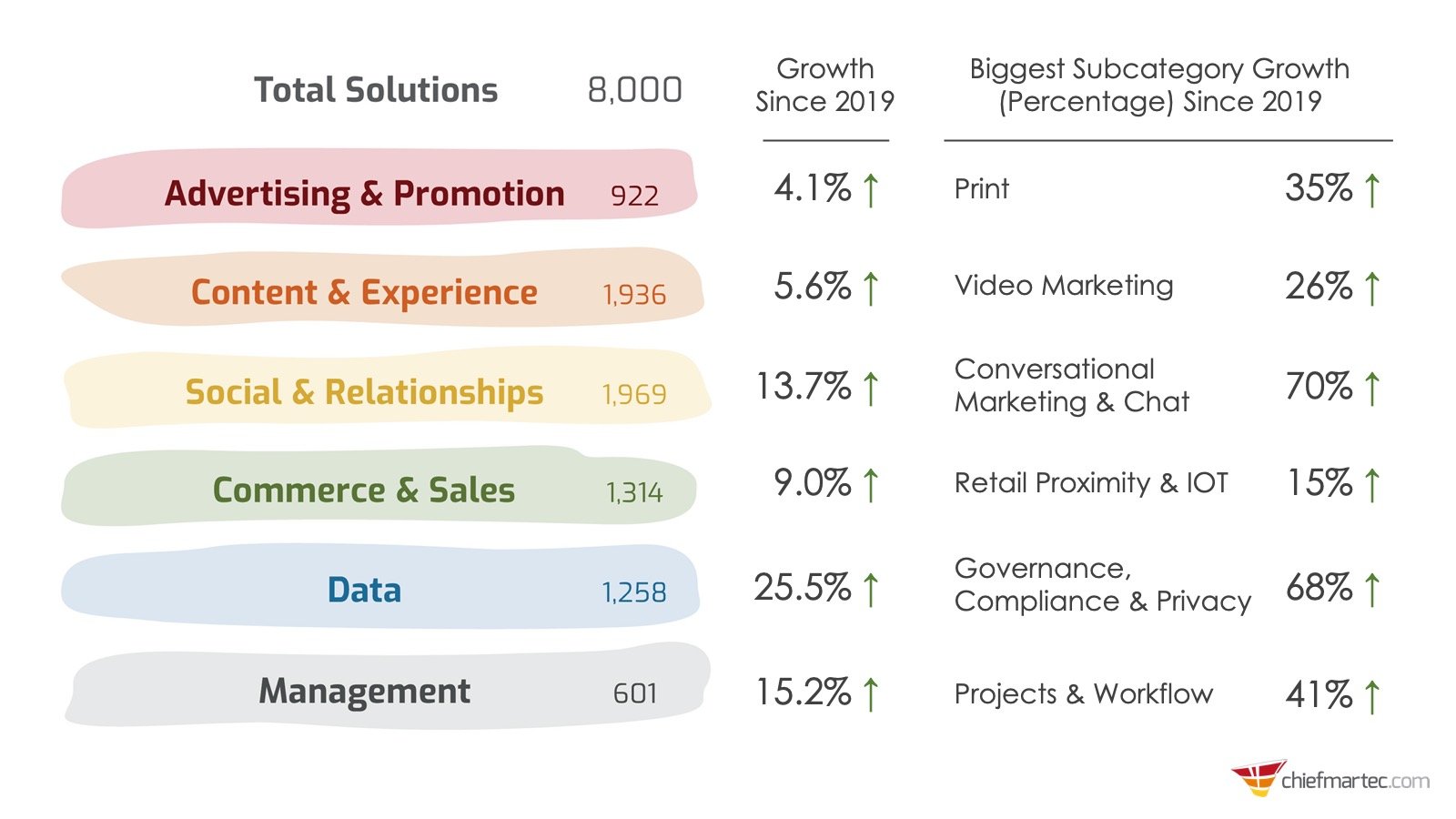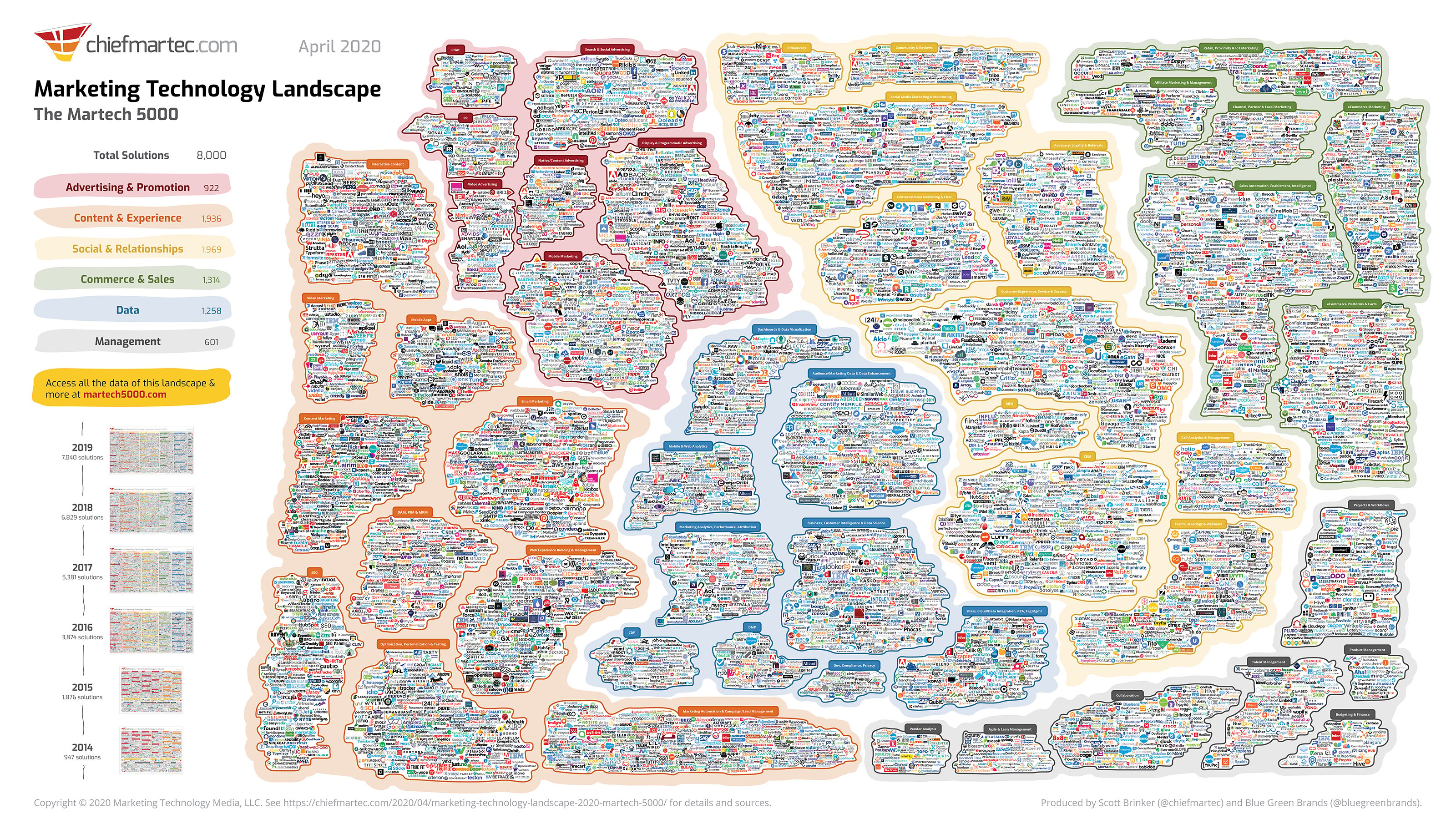
We quiz Scott Brinker on his MarTech predictions
Last week we (virtually) crossed the Atlantic to chat to the King of MarTech, Scott Brinker. Scott is the founder and editor of website ChiefMartech.com which looks at all thing combining marketing and tech. He's also the founder and now Chair of the successful MarTech conference and the author of the best-selling book ‘Hacking Marketing’ which discusses agile marketing - a topic we have previously discussed on the podcast.
Based in Boston, Scott is currently working as VP platform ecosystem for HubSpot and is much in demand for his knowledge and insights into the MarTech movement. So we were extremely excited to have him chat to our Digital Marketing Manager, Briony about the future of MarTech and his favourite British idioms on our latest podcast.
Scott, welcome to the Bright podcast! We did notice on your Twitter feed yesterday that you are a fan of British phrases like bits and bobs...
Oh wow, we could do a whole podcast just on the British language - it’s much more charming than mine! I visit the UK a fair amount, not here in 2020 unfortunately but hope to be back again soon.
People look to you as an expert in MarTech. How did you get into it in the first place and what interests you most?
When I started in MarTech I was running the technology team for a web development agency and our company would get hired by marketing organisations to implement their website dreams. It would then be me and my team’s responsibility to connect up with that company's IT department and decide how we actually go and build this interface into their systems. This was 20 years ago when there was a distance between the marketing department and the IT department - they had different skills, different ways of talking about things, different nomenclature, different incentives. They were far apart on the spectrum but when you looked at what companies were starting to do around engaging with their customers through digital channels, I realised that these two groups were going to have to become deeply entwined in how they collaborate together.

The face of a man who knows quite a bit about MarTech!
That started my fascination with people who were crossing those two departments. I called them ‘marketing technologists’, very often these were the people with technical skills that were coming to collaborate deeply, and in many cases actually started to just work directly in the marketing department. That started me down this path and I’m fascinated by that evolution - it's incredible to see now that technology management and operations are deeply embedded in most marketing departments. And then as part of that, I've also ended up studying all the different technologies that these marketing technologists end up working with. So it's been a really fascinating journey.
You have a brilliant 'super graphic' that you put together every year called the MarTech 5000. This year, you've pointed out that it's more like 8000 people in there, which charts the growth of tech solutions available in the industry. Every year you talk about what's grown and what those changes look like - one of the things you mentioned this year was that social talking and communication tech will be the two biggest growth areas in the subcategories between last year and this year. So what areas do you see as the winners and losers over the next year?
Wow, that's a hard question to answer because one of the things that has surprised me over the decade that I've been making that chart is obviously the growth. The first version of the chart had around 150 marketing technologies on it and I remember at the time everyone including me was like wow, 150 different technologies! That’s an awful lot and so to have seen it grow exponentially to 8000 in just a decade, it is kind of mind blowing. But I think the other thing that's really surprised me is I get asked every year, where is the innovation? Which category is where the stuff is really happening right now? And it's always hard to answer because to be honest, almost every single category continues to evolve and innovate.

MarTech category growth from 2019-2020 via ChiefMartech.com
One of the examples I can give you is arguably the oldest category on the MarTech landscape - content management systems. Before we did anything else in digital marketing, the first thing that happened was more guaranteed a page for our website, there's been content management systems for 25 years, you would think by now, if any category was going to be okay and move on to the next thing, it would be CMS, but it's absolutely not the case. The innovation that's happened in the past few years around content management systems, all these increasingly distributed architecture - this whole concept of headless CMS, the intersection between CMS and ways we're leveraging things - mobile apps and voice assistance. For a field that should have been completely consolidated and matured to a full levelling off, it continues to innovate.
I just see so many categories evolving, but I won't entirely dodge your question. I guess one of the things that's really intriguing right now is in the past few years, all the new regulations and compliance around privacy - I'm a big fan of I think this is really important in many ways. While it's been challenging for a lot of marketing organisations to figure that out, there's a really incredible opportunity here to use this as an opportunity to build better quality data and have a more personal relationship that respects the preferences of our audience. And so there's just an incredible number of tools that are starting to expand up in that area.
As part of that you've mentioned recently about the long tail of marketing. There's a really great graphic you've developed which talks about this idea of how we've got 8000 this year, but actually, it's grown exponentially. Because in a lot of companies there's been consolidation as well as plenty of new startups. Is there a way that you could describe that in a little bit more detail to our listeners?
So every time when I publish these graphics of thousands and thousands of MarTech companies, one of the questions people ask is like, oh, my goodness, I mean, like, do I have to choose among all 8000? You know, isn't there supposed to be some sort of consolidation happening in the market and so one of the first things I admit is okay, that the landscape with 8000 logos in many ways is not a very good representation of the industry because all those logos are not equal in scale or size or influence. The long tail diagram - this idea of saying okay, well out of these thousands of marketing technology companies, there's really a relatively small number that are the major platforms - these are essentially the public companies in the MarTech space. So you've got Adobe and Salesforce and Oracle and Microsoft and HubSpot. There's a relatively small set of those and to be honest, they have a tremendous market share.
As you start to go down that long tail you'll have leaders who are category leaders in more specialised functionality and capabilities, and then even further down, you get into more and more of these specialists. Now, some of those are like startups, and are hoping someday they will become the next Microsoft or Google who knows some of them may, but increasingly, what's really interesting in the in the market is you see this symbiotic relationship between those major platforms in the head of the tail, and the specialist apps in the long portion of the tail where the specialist apps increasingly integrate with those major platforms.
And so the whole advantage of this is for a marketer, you pick the major platform that you're going to build your marketing stack around, and you have a relatively finite set of choices there. And then based on that, you can look at the specialised tools that integrate with the platform you chose, if you want to augment the capabilities of that platform with something that's either some new emerging technology or something that's very specialised to your industry, or vertical or just some particular capability that you want that isn't in that core platform. And so it's really starting to get a little bit of structure to the industry. And hopefully, we're still on this journey. But hopefully, this will actually make it easier for marketers to harness all that innovation without having to just look at it as a big scary mess of 8000 companies.

The Marketing Technology Landscape 2020
You’re right, it looks terrifying initially but then when you can get into the detail how it all connects is absolutely an opportunity. So I can't get away from this question. I'm gonna have to ask about COVID-19. There's been a huge factor for businesses this year, we've obviously seen the rise of platforms such as Zoom, what do you think the biggest change might be following the way for Corona on the MarTech space over the next year?
Yeah, it's a really important question for both marketers, but also MarTech companies. I look at it as both a combination of headwinds and tailwinds, like challenges to this industry in this capability, but then also some things that are helping to accelerate it - obviously, the biggest challenge is just the macro uncertainty. Economies all around the world are still trying to figure out what the road out of COVID is going to look like. I think that it is gonna have ripple effects for some time, but in sort of balancing out the challenge of that uncertainty. I think one of the things that's actually been a tailwind for marketing and MarTech is this crisis has really brought home the need for two things; one for businesses to be able to engage with their customers through digital channels in a deeper way in a, you know, more complete way and a more delightful way from the customer's perspective. A big part of marketing technology is helping to manage that customer journey across all these different digital touch points. When we ended up in a world here, where for a lot of businesses, the only way we can engage with our customers was digital, that really motivated everyone to start to make some serious investments in planning and how we get better at that.
I think the other piece of it is more internal for businesses that have had the luxury of being able to keep operating, but they need to have their staff working remotely from home. A lot of these tools and processes that were in place before COVID, it's sort of made a lot of assumptions of we'll get this meeting together here and there'll be this queue of this person who manages this and I think one of the things we realised in an environment where either by choice or necessity, we need to be able to have more remote employees, the support for greater decentralisation in our tool set - giving people more self service tools that they can use in marketing to do data analysis or to be able to run lightweight experiments with a campaign or a programme for a particular segment of the audience they're working with the opportunity there has become really clear. And so again, I think that's motivating a lot of innovation in MarTech and in the adoption of these technologies as well.
You've actually mentioned in your release this year of the MarTech 5000 that new entrants have risen by more than 20 percent between 2019 and 2020. We've also discussed this in the wake of Corona, there may be potential opportunities for growth and innovation as well. So actually, what advice would you give to someone who has a great idea and wants to create their own piece of MarTech right now in the context of everything that's happening, what would your advice be?
Now you've got a really great set of questions for me here. So I think I believe all businesses start with the customer and start with like, what is either the problem that the customer is having that we're going to address or is there an opportunity that is being underserved for them. Clay Christensen, a great strategy leader, has written about this concept of jobs to be done, but every customer, whether they're consumer or business, have jobs that they need to get done.
The real trick in coming up with a great product is to be able to understand that job and be able to do it better for the customer than existing solutions offer. So I'd really start with that because to be honest, in the implementation of software there really aren't any barriers to that anymore. If you understand the customer problem you're going to solve, you have a clear vision of how you're going to solve it. The technical bits and bobs are incredibly low barriers to entry now, taking advantage of all these cloud platforms, Amazon and Google and Microsoft have all these great open source projects you can use as the foundation for your system.
It's easier than ever to plug into a global network of talent. The actual software portion itself, I want to say it's easy, but it certainly feels like the easiest piece of the equation. The challenge is to find a great customer problem that you have a really novel idea for how to solve better!
What are your top five MarTech startup companies that are the ones to watch over the next year and why?
So I'm going to dodge that question because it's hard to actually pick five. Whichever five I pick I'm going to hear from 500 others! They're like, what do you mean you were just talking to me the other day, why not us, but I will give you some hints. One of the things that amazes me is just how much innovation keeps happening in this space. And so if you want to be a bit of a observer of the the edge of where this is happening, there's a site called ProductHunt.com, which particularly in the tech world has become a place where people go to like, oh, here's this new product, or here's this new version, or here's this new thing we’re releasing and they get a bunch of people to comment on it and upload it.
And it's incredible - there are thousands of products going through that and they're mostly tech products. So they cover the gamut of you know, software as a service, but a huge chunk of them are actually relevant to marketing and sales revenue operations teams. If you go to Product Hunt and you just peek in on that on a weekly basis, I guarantee you you will be astounded by some of the innovative startups that keep launching in this space.
I'm kind of sad but also quite happy that you dodged that question. Thank you so much, Scott, for joining us for this. This has been absolutely fascinating. And I feel like I could probably talk to you all day about this.
Sadly, I know that I can talk all day about that, too. So we'll spare your listeners that but thank you so much for having me on the show.
If you’d like to hear more from Briony and the team you can listen to the whole podcast on Spotify and Apple Podcasts or check out our other episodes.
Our podcasts are recorded and produced by the brilliant Laura Evans at Let's Talk Video Production.

